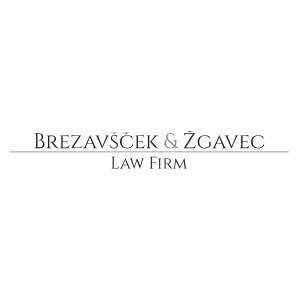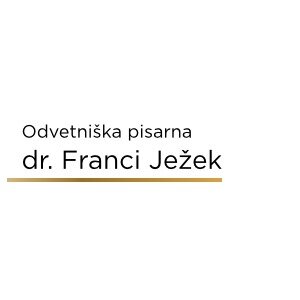Best Renewable & Alternative Energy Lawyers in Ljubljana
Share your needs with us, get contacted by law firms.
Free. Takes 2 min.
List of the best lawyers in Ljubljana, Slovenia
About Renewable & Alternative Energy Law in Ljubljana, Slovenia
Renewable and alternative energy law in Ljubljana, Slovenia, governs the development, implementation, and regulation of clean energy sources such as solar, wind, hydropower, and biomass. The city and national government are committed to reducing carbon emissions and increasing energy production from sustainable sources. Regulations support innovations and encourage both individuals and businesses to invest in alternative energy solutions. Legal frameworks are designed to support Slovenia’s transition to a low-carbon economy while protecting the environment and ensuring public safety.
Why You May Need a Lawyer
Engaging a lawyer is useful when navigating the complex legal environment surrounding renewable and alternative energy in Ljubljana. Common situations include:
- Securing permits for the installation of solar panels or wind turbines
- Negotiating land use or lease agreements for energy projects
- Handling disputes with neighbors, contractors, or energy providers
- Complying with evolving local and national energy regulations
- Navigating incentives, tax benefits, or government grants
- Addressing grid interconnection issues and power purchase agreements
- Ensuring compliance with environmental impact assessments
- Protecting intellectual property in new energy technologies
- Participating in community energy projects
- Representing interests in administrative or judicial proceedings
Local Laws Overview
Ljubljana operates within the legal framework of Slovenia and the European Union, which sets ambitious targets for renewable energy production and emissions reductions. Key legal aspects include:
- Energy Act: The main Slovenian energy law defines obligations for producers, distributors, and consumers of alternative energy.
- Environmental Impact Assessment: Larger energy projects require thorough assessments to ensure minimal environmental disruption.
- Construction Permits: Installing renewable energy systems often involves securing approvals from Ljubljana’s municipal authorities.
- Feed-in Tariffs and Incentives: There are specific incentives and subsidies for generating renewable energy, managed at both national and local levels.
- Grid Connection Rules: Procedures are in place for safely connecting renewable energy solutions to the public grid.
- Zoning and Land Use: Land must be appropriately zoned, and community consultation or public participation may be required for certain projects.
- EU Directives: Slovenian laws are influenced by European Union regulations, which directly impact standards, targets, and funding opportunities.
Frequently Asked Questions
What types of renewable energy are most common in Ljubljana?
Solar, hydropower, and biomass are the most widely used sources in the Ljubljana area, followed by heat pumps and some small wind installations.
Do I need planning permission to install solar panels on my home?
For standard residential rooftop installations, simplified procedures often apply, but specific planning or building permits may still be required depending on the location and building type.
Are there financial incentives for renewable energy projects?
Yes, both state and municipal authorities offer grants, subsidies, or feed-in tariffs to encourage the adoption of renewable energy systems.
What legal steps are involved in starting a renewable energy business?
You must register your business, obtain the necessary energy production licenses, comply with safety and environmental laws, and secure permits for your specific site and technology.
Do local laws support community energy projects?
Yes, Ljubljana and Slovenia provide legal frameworks for citizens or groups to form energy co-operatives and collectively invest in renewable energy projects.
How can I connect my renewable energy system to the public grid?
You must apply to the local distribution system operator, comply with technical and safety standards, and proceed through the grid connection process, which may involve legal agreements.
What regulations apply to wind energy installations?
Wind energy projects require rigorous environmental and planning approvals, especially for larger turbines, to ensure they meet noise, safety, and visual impact standards.
Does renewable energy development require an environmental impact assessment?
Major projects are subject to environmental impact assessments to evaluate potential effects on nature, water, air, and nearby communities.
Can businesses sell surplus energy back to the grid?
Yes, Slovenian law allows producers to feed surplus electricity into the grid, usually under regulated feed-in tariffs or purchase agreements, subject to licensing and technical requirements.
What should I do if a neighbor objects to my renewable energy project?
A lawyer can help resolve disputes by reviewing property rights, ensuring compliance with regulations, and mediating discussions with neighbors or municipal authorities.
Additional Resources
If you need further information or support, consider contacting:
- Ministry of the Environment, Climate and Energy of the Republic of Slovenia
- Energy Agency of the Republic of Slovenia
- Municipality of Ljubljana's Department of Environmental Protection
- Chamber of Commerce and Industry of Slovenia - Renewable Energy Section
- Slovenian Sustainable Energy Association
- Renewable energy and environmental NGOs in Slovenia
Next Steps
If you need legal assistance with renewable or alternative energy in Ljubljana, begin by identifying your specific issue or project goals. Gather all relevant documents, such as property records or project plans. Consult with a lawyer who specializes in energy law to review your case, explain your rights and obligations, and help with any applications, permits, or disputes. It is advisable to act early in the planning process to avoid legal obstacles and maximize your eligibility for incentives or funding.
Professionals in this field can guide you through local regulations, represent you before authorities, and ensure your project aligns with both city and national policies for sustainable energy.
Lawzana helps you find the best lawyers and law firms in Ljubljana through a curated and pre-screened list of qualified legal professionals. Our platform offers rankings and detailed profiles of attorneys and law firms, allowing you to compare based on practice areas, including Renewable & Alternative Energy, experience, and client feedback.
Each profile includes a description of the firm's areas of practice, client reviews, team members and partners, year of establishment, spoken languages, office locations, contact information, social media presence, and any published articles or resources. Most firms on our platform speak English and are experienced in both local and international legal matters.
Get a quote from top-rated law firms in Ljubljana, Slovenia — quickly, securely, and without unnecessary hassle.
Disclaimer:
The information provided on this page is for general informational purposes only and does not constitute legal advice. While we strive to ensure the accuracy and relevance of the content, legal information may change over time, and interpretations of the law can vary. You should always consult with a qualified legal professional for advice specific to your situation.
We disclaim all liability for actions taken or not taken based on the content of this page. If you believe any information is incorrect or outdated, please contact us, and we will review and update it where appropriate.

















